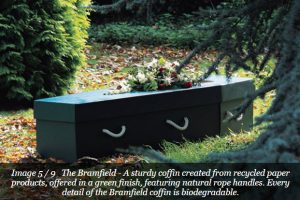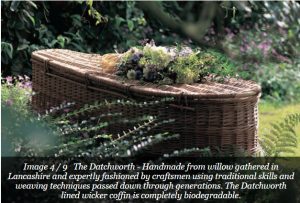
We live in a world where sustainability and ‘being green’ are finally at the forefront of many conversations and ways of living. But while most of us do what we can to live our lives in the most environmentally friendly way possible, how many of us have thought about continuing to be green even after we have passed away?
According to the United Nations Department of Economic and Social Affairs, it is estimated that by 2040 there will be 80 million deaths a year across the globe, and by 2060 this will be as high as 102 million per year. Unfortunately, funerals, burials and cremations, as they currently stand, are not very environmentally friendly affairs.
It’s hard to compute the scale of just how many bodies need to be buried or cremated per year; each one taking up energy, space, time and material. While it can seem wrong to think of it in this way, there are decisions we can all make to improve the sustainability of our own funerals, as well as what happens to our bodies after we die and what happens to all of our possessions. After all, no one wants to spend their lives doing what they can to help save the planet, only to leave a negative legacy behind them.
So what can realistically be done? Well, burials are much better for the environment than cremations, simply because of the huge amount of energy cremation requires to take place. That said, burials take up a lot of space and produce things that we don’t even think affect the environment, such as contaminants from coffins that can leak into the earth. This is something that can be easily helped with eco-friendly coffins. For those who’d like a biodegradable coffin there are many now available in all sorts of materials. Here at Austin’s we have a choice of two coffins. The Datchworth is handmade from English willow gathered in Lancashire and the Bramfield is made with sturdy recycled paper in a green finish with natural rope handles.

You could also opt for a green burial site. These are established woodlands or meadows covered in newly planted trees, which in turn helps the environment. We’re very green-minded and have lots of trees at Harwood Park, including our large woodland, Spencer Wood. Biodegradable burial pods are also becoming popular. They convert your body into a new tree over time – either as it decomposes or from the ashes. You become part of the earth’s natural system as the circle of life continues.
An article from National Geographic back in 2019 states that 78% of funerals in the UK are cremations. But did you know that the energy just one cremation uses is roughly equivalent to the energy usage of a single person over a whole month? Globally, cremation emits over 6.8 million metric tons of carbon dioxide each year, accounting for around 0.02% of world carbon dioxide emissions. Given the popularity of cremations though, and the fact that they are around a third of the price of burials, can there be a greener alternative?
Making its way around America – but yet to be legalised in the UK – is a type of water cremation known as resomation. The body is gently dissolved in a water lye solution through a process of alkaline hydrolysis. Testing will be needed before it is allowed to be used here in the UK, but it could be a greener alternative for the future that doesn’t burn the volume of fossil fuels that traditional cremation does.
You’ve probably already heard of cryomation. It involves immersing the body in liquid nitrogen at a temperature of -196 degrees Celsius. It creates zero emissions and all of the body is returned (less the moisture) instead of approximately 2.5% of the body with cremation. The body becomes brittle and breaks up into small particles, which are freeze dried and placed into a biodegradable container. These remains are in a form that can be buried with much less space required, or can even give ongoing life, as you can use them to plant a tree, bush or other plant.
In 2020, Washington state became the first in America to legalise another new alternative to cremation; recomposition. Similar to a natural burial, bodies are turned to soil mulch through natural and efficient composting processes, and can then be used to plant new life.
Of course, funerals and wakes can always be made more eco friendly too, by thinking about the flowers and produce you use. Rather than choosing flowers that have to come from abroad, opt for those in season locally, or go very simple with wildflowers that are sustainably sourced. The same goes for any food and refreshments you serve afterwards; using locally sourced produce will reduce your carbon footprint significantly.

